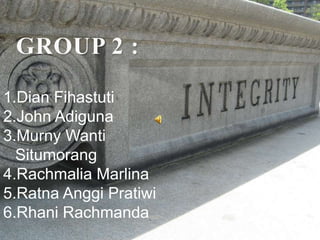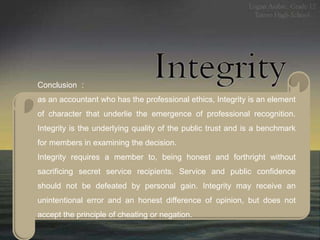Presentation1
- 1. 1.Dian Fihastuti 2.John Adiguna 3.Murny Wanti Situmorang 4.Rachmalia Marlina 5.Ratna Anggi Pratiwi 6.Rhani Rachmanda
- 2. Integrity is the quality of being honest and having strong moral principles, moral uprightness. It is generally a personal choice to uphold oneself to consistently moral and ethical standards. In ethics, integrity is regarded by many people as the honesty and truthfulness or accuracy of one's actions. Integrity can stand in opposition to hypocrisy, in that judging with the standards of integrity involves regarding internal consistency as a virtue, and suggests that parties holding within themselves apparently conflicting values should account for the discrepancy or alter their beliefs.
- 3. The word integrity evolved from the Latin adjective integer, meaning whole or complete. In this context, integrity is the inner sense of "wholeness" deriving from qualities such as honesty and consistency of character. As such, one may judge that others "have integrity" to the extent that they act according to the values, beliefs and principles they claim to hold. A value system's abstraction depth and range of applicable interaction may also function as significant factors in identifying integrity due to their congruence or lack of congruence with observation. A value system may evolve in a while, while retaining integrity if those who espouse the values account for and resolve inconsistencies.
- 4. In ethics when discussing behavior and morality, an individual is said to possess the virtue of integrity if the individual's actions are based upon an internally consistent framework of principles. These principles should uniformly adhere to sound logical axioms or postulates. One can describe a person as having ethical integrity to the extent that the individual's actions, beliefs, methods, measures and principles all derive from a single core group of values. An individual must therefore be flexible and willing to adjust these values in order to maintain consistency when these values are challenged, such as when an expected test result fails to be congruent with all observed outcomes. Because such flexibility is a form of accountability, it is regarded as a moral responsibility as well as a virtue.
- 6. Conclusion : as an accountant who has the professional ethics, Integrity is an element of character that underlie the emergence of professional recognition. Integrity is the underlying quality of the public trust and is a benchmark for members in examining the decision. Integrity requires a member to, being honest and forthright without sacrificing secret service recipients. Service and public confidence should not be defeated by personal gain. Integrity may receive an unintentional error and an honest difference of opinion, but does not accept the principle of cheating or negation.







